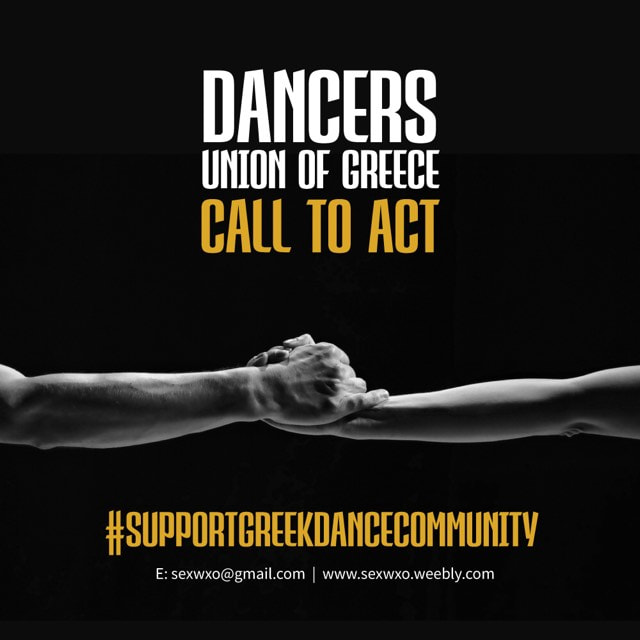Dancers’ Union of Greece
Call to action: We ask all dance and cultural institutions, artists and art workers of Europe to join us in calling for a sustainable dance education and practice in Greece and sign the following petition.
Petition to the Greek Ministry of Culture
Faced with greek cultural politics and policy throughout decades contemporary dance in Greece is systematically neglected and marginalized by public policy, deprived from any serious state funding for education, structures, professional opportunities and productions. The conflation between public and private sector, with the hegemonic role of the latter creates disastrous repercussions for the art of dance in Greece due to the lack of two fundamental institutions:
Public University Department for dance studies and National Dance House.
Next to the foundation of a National Dance House, an important step for creating sustainable conditions for dance in Greece would be the institution of choreographic centers along the country which could contribute to the decentralization. Based on an extensive survey which was held throughout 2021 from the DANCERS’ UNION of Greece (ΣΕΧΩΧΟ) the 77% of work and activities related with dance takes place in Athens.
Rapid privatization of institutions, growing dependency on “philanthropy”, cuts in art funding and universities and the exclusion of dance teachers from all levels of education due to lack of Bachelor Degree equivalence are the crumbling conditions in which dance artists in Greece are called to work, create and perform. This case is far from being sustainable.
The ‘22-’23 governmental budget for contemporary dance allocates a sum total of 400.000 euros. This is a drastic cut, part of the greek government decision taken this year to slash the budget dedicated to dance by 60%. As a result, from the start of 2023, countless dance companies, dance artists, theaters and studios will see their activity cut off altogether or severely curtailed. The Ministry of Culture pushes hundreds of artists to unemployment and precarious work and dance will lose a lot of diversity, with the more experimental and small scale organizations struggling to survive. Companies that are not subsidized and don't have partners, will already start to shut down their businesses this year as already announced in several smaller cities in Greece.
Against this neoliberal backdrop, the growing mobilization and activation of dance workers in the last 3 years around issues of sustainability, labor rights and collective claims has created a unique dynamic. The recent two-day symposium “An imaginary Public University for Dance”, the event meeting named “State Dance House_Act I”, the several demonstrations and open letters along with proposals on cultural policy and restorative meters submitted to Ministry of Culture by our working groups (made of dancers and choreographers), a small open library for dance inaugurated by the Dancers Union of Greece are a few examples.
The Union articulated early on a set of key demands which have been embraced by the whole dance community, namely the increase of financial support by public institutions; the establishment of a public University of Dance and the creation of a National Dance House. The fulfillment of these demands constitutes a vital and urgent step if we want the community of dance workers and artists to survive, but also to flourish.
There is a flourishing and promising dance community built through the sacrifices that artists themselves have made during the last decade. We fight and operate under very precarious and unsustainable conditions. The price is high and the percentage of dance workers with income under the poverty threshold reached 65% for the year 2021.
From Gayatri Chakravorty Spivak’s question “can the subaltern speak?” we move to the question “can the dance workers and artists be heard?”. We can speak, we can imagine, we can dream. We are dancers, choreographers, teachers, researchers, students, artists, creators, writers, programmers, institution curators, dance audience
The dance community across Europe and abroad is urging its voice and asking the greek government to:
-Immediately reverse the 60% cut of funds for dance and provide adequate financial support to dance artists and workers
- Invest in the creation of a public Dance House and public choreographic centers in Greece
-Invest in the creation of a Public University Department for dance studies in Greece
- Guarantee a Bachelor's Degree equivalent for the existing dance education in Greece
Equal opportunities in academic education and artistic creation for everyone.
Equal access to the art of dance as commons for everyone.
#supportgreekdancecommunity
You can sign the open letter here:
Call to action: We ask all dance and cultural institutions, artists and art workers of Europe to join us in calling for a sustainable dance education and practice in Greece and sign the following petition.
Petition to the Greek Ministry of Culture
Faced with greek cultural politics and policy throughout decades contemporary dance in Greece is systematically neglected and marginalized by public policy, deprived from any serious state funding for education, structures, professional opportunities and productions. The conflation between public and private sector, with the hegemonic role of the latter creates disastrous repercussions for the art of dance in Greece due to the lack of two fundamental institutions:
Public University Department for dance studies and National Dance House.
Next to the foundation of a National Dance House, an important step for creating sustainable conditions for dance in Greece would be the institution of choreographic centers along the country which could contribute to the decentralization. Based on an extensive survey which was held throughout 2021 from the DANCERS’ UNION of Greece (ΣΕΧΩΧΟ) the 77% of work and activities related with dance takes place in Athens.
Rapid privatization of institutions, growing dependency on “philanthropy”, cuts in art funding and universities and the exclusion of dance teachers from all levels of education due to lack of Bachelor Degree equivalence are the crumbling conditions in which dance artists in Greece are called to work, create and perform. This case is far from being sustainable.
The ‘22-’23 governmental budget for contemporary dance allocates a sum total of 400.000 euros. This is a drastic cut, part of the greek government decision taken this year to slash the budget dedicated to dance by 60%. As a result, from the start of 2023, countless dance companies, dance artists, theaters and studios will see their activity cut off altogether or severely curtailed. The Ministry of Culture pushes hundreds of artists to unemployment and precarious work and dance will lose a lot of diversity, with the more experimental and small scale organizations struggling to survive. Companies that are not subsidized and don't have partners, will already start to shut down their businesses this year as already announced in several smaller cities in Greece.
Against this neoliberal backdrop, the growing mobilization and activation of dance workers in the last 3 years around issues of sustainability, labor rights and collective claims has created a unique dynamic. The recent two-day symposium “An imaginary Public University for Dance”, the event meeting named “State Dance House_Act I”, the several demonstrations and open letters along with proposals on cultural policy and restorative meters submitted to Ministry of Culture by our working groups (made of dancers and choreographers), a small open library for dance inaugurated by the Dancers Union of Greece are a few examples.
The Union articulated early on a set of key demands which have been embraced by the whole dance community, namely the increase of financial support by public institutions; the establishment of a public University of Dance and the creation of a National Dance House. The fulfillment of these demands constitutes a vital and urgent step if we want the community of dance workers and artists to survive, but also to flourish.
There is a flourishing and promising dance community built through the sacrifices that artists themselves have made during the last decade. We fight and operate under very precarious and unsustainable conditions. The price is high and the percentage of dance workers with income under the poverty threshold reached 65% for the year 2021.
From Gayatri Chakravorty Spivak’s question “can the subaltern speak?” we move to the question “can the dance workers and artists be heard?”. We can speak, we can imagine, we can dream. We are dancers, choreographers, teachers, researchers, students, artists, creators, writers, programmers, institution curators, dance audience
The dance community across Europe and abroad is urging its voice and asking the greek government to:
-Immediately reverse the 60% cut of funds for dance and provide adequate financial support to dance artists and workers
- Invest in the creation of a public Dance House and public choreographic centers in Greece
-Invest in the creation of a Public University Department for dance studies in Greece
- Guarantee a Bachelor's Degree equivalent for the existing dance education in Greece
Equal opportunities in academic education and artistic creation for everyone.
Equal access to the art of dance as commons for everyone.
#supportgreekdancecommunity
You can sign the open letter here:


